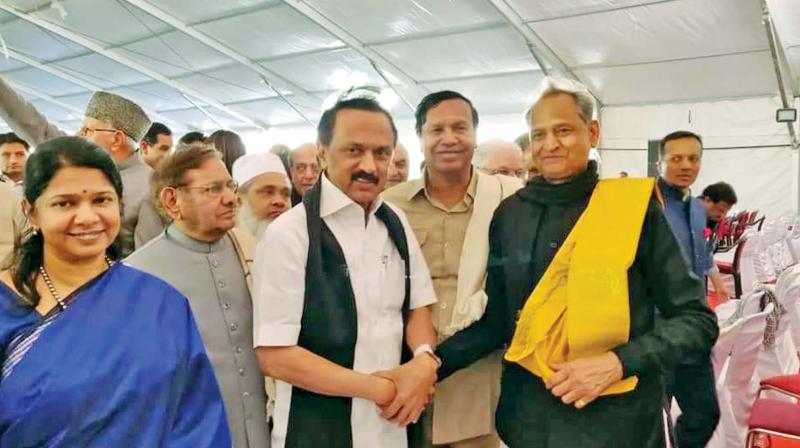Did Stalin jump the gun in proposing Rahul for PM?

Chennai: The 2019 Lok Sabha elections are barely five months away from now and there is understandably a sense of urgency in the mega opposition combine taking shape against the BJP across the country to concretise poll strategy, prepare cadres and choose its Prime Ministerial candidate. Some of the constituent leaders, though, have suggested a disastrous alternative: choose the PM after counting the poll score.
It's in this context that the DMK president MK Stalin's proposal, made at his Sunday rally here to mark the unveiling of his late father M Karunanidhi's statue, that Congress President Rahul Gandhi be the PM nominee of the opposition front, has drawn varied, mostly not-too-happy, responses.
Already, the CPI (M) general secretary Sitaram Yechury, who is now playing a vital role in shaping a Congress-inclusive secular combine of Left and regional parties, along with TDP supremo and Andhra Pradesh Chief Minister N. Chandrababu Naidu, to take on Narendra Modi's saffron juggernaut, does not appear to be on the same page with Stalin on this Rahul-as-PM slogan.
The Marxist leader and Stalin are expected to meet on Tuesday in Chennai. For the DMK chief, that's bound to be a very significant session with one of the best political buddies of dad.
A day after Stalin's announcement proposing Rahul for the country's top post, on the lines of his father 'Kalaignar' having taken the lead to commend the names of Indira Gandhi in 1980 and later in 2004 of Sonia Gandhi, inviting them to lead the country as Prime Minister ahead of the crucial general elections during those years, Yechury was not the one to applaud its political correctness.
"Opposition will declare its Prime Ministerial candidate only after the 2019 Lok Sabha election," the CPI (M) leader has said, indicating that Stalin's proposal could at best be his own personal choice.
Seasoned political observers here point out that with equally important regional leaders in the anti-BJP spectrum, most notably Trinamul Congress leader Mamata Banerjee not present at the statue unveiling function, Stalin could have been more circumspect than make his dramatic declaration even if he had wanted to clinch the DMK-Congress alliance in Tamil Nadu.
After all, Central trade unions are planning a mega protest in Delhi in January and there could be other opportunities well before the elections to interact on crucial issues; so Stalin's proposal may not go down well with all the smaller parties and the DMK leader may have unwittingly thrown a spanner in the works, they underscored.
"Defeating the BJP is the foremost concern and the premise on which Naidu and Yechury are working and that must not be defeated, especially not from within. Stalin could have waited a bit, taken all key players on board," said a senior member of the emerging opposition coalition, requesting anonymity.
Nonetheless, sources in the DMK maintain that Stalin struck "when the iron is hot". Congress is naturally the largest all-India party in the driver's seat in any major opposition grand alliance across the country; and Rahul's profile has undergone a sea change since his party's win in Karnataka earlier this year in alliance with Janata Dal (Secular), followed by the latest three very significant victories in the latest Assembly polls, by unseating the BJP in the states of Madhya Pradesh, Rajasthan and Chhattisgarh. Considering these factors, Stalin could not have found a more politically weighty moment to push for Rahul's candidacy as DMK's preference, the sources explained.
The other factor that possibly weighed with Stalin, the sources said, was that Tamil Nadu and Puducherry together contribute 40 MPs, which in at least four occasions in the recent past - 1996, 1998, 1999 and 2004 Lok Sabha polls - have been a game-changer in the party forming the government at the Centre. Stalin possibly felt that projecting a national Congress leader upfront would strengthen the secular alliance in Tamil Nadu for the 2019 Lok Sabha polls.
But if this strategy were to ruffle feathers of other allies, like the Left Front in Kerala, in Andhra Pradesh where Chandrababu Naidu's bold gambit of striking a deal with Congress in Telangana had not yielded any result, or for that matter with the Samajwadi party in the bigger Hindi-speaking states like U.P., then Stalin and the DMK will have to carry the burden of a bigger cross in convincing all of them. It is in that backdrop the Stalin-Yechury meeting will be very crucial.

